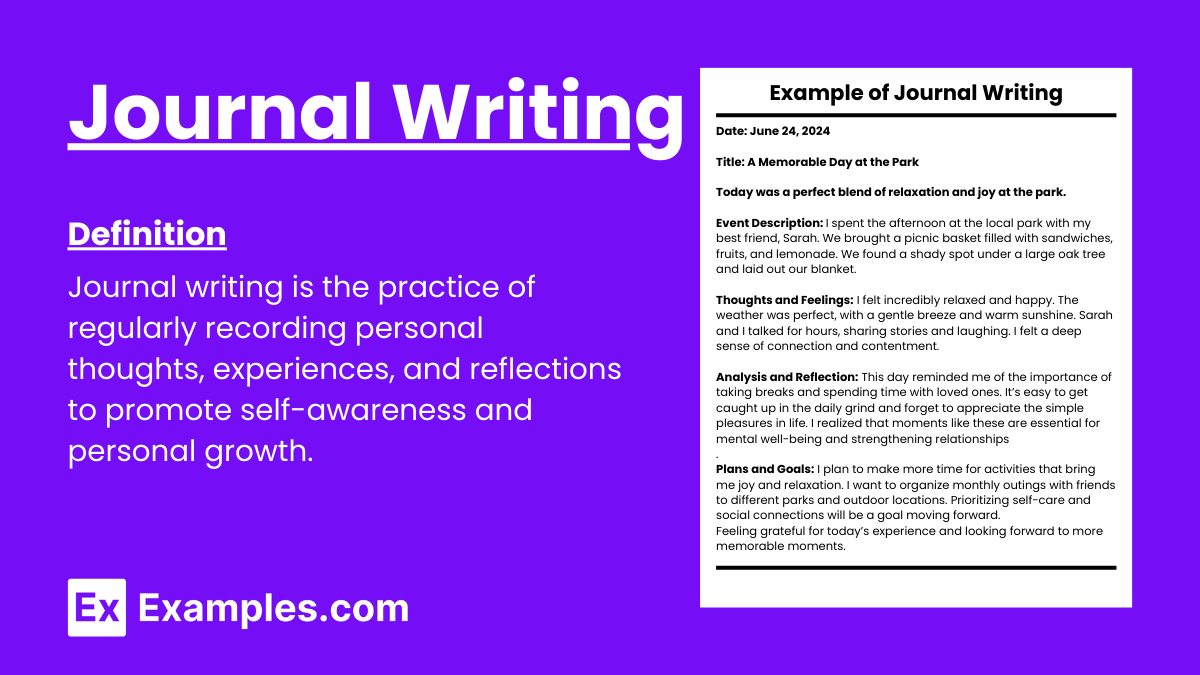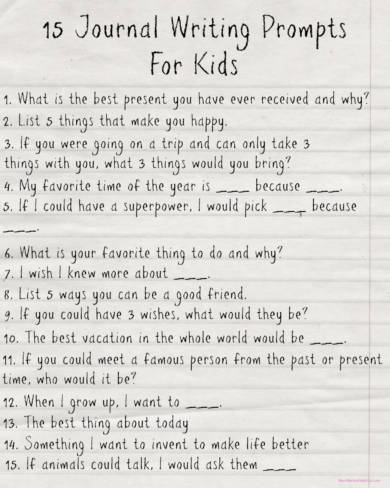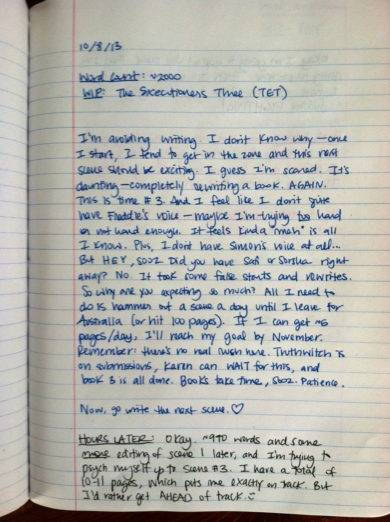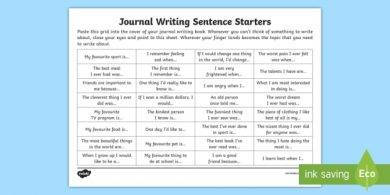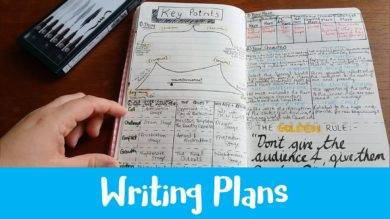12+ Journal Writing Examples to Download
Journal writing involves regularly recording personal thoughts, experiences, and reflections in a written format. It’s a practice that encourages self-expression, introspection, and creativity. People use journals to document daily events, explore their emotions, and track personal growth. Journal writing can be therapeutic, offering a private space for individuals to process their feelings and ideas. This practice can enhance writing skills and provide a historical record of one’s life journey.
What is Journal Writing?
Journal writing is the practice of regularly recording personal thoughts, experiences, and reflections in a written format. It encourages self-expression, introspection, and creativity, allowing individuals to document daily events, explore emotions, and track personal growth. This therapeutic practice can enhance writing skills and provide a historical record of one’s life journey.
Journal Writing Format
A well-structured journal entry can help you organize your thoughts and reflect more effectively. Here’s a guide to the journal writing format, including essential components and tips for each section.
1. Date
Start each entry with the date. This helps track your thoughts and experiences chronologically.
- Format: Use a consistent date format, such as “June 24, 2024” or “24/06/2024.”
2. Title (Optional)
A title can provide a quick reference to the content of the entry. It’s optional but can be useful for organization.
- Example: “Reflections on Today’s Meeting” or “Weekend Getaway to the Mountains.”
3. Opening Sentence
Begin with an opening sentence that sets the tone for your entry. This can be a summary of the day, an observation, or a thought-provoking statement.
- Example: “Today was a mix of excitement and challenges at work.”
4. Body
The body of your journal entry is where you elaborate on your thoughts, experiences, and reflections. Here’s a suggested structure:
a. Event Description
Describe the main events or activities of the day. Be specific and include details.
- Example: “I attended a team meeting where we discussed the new project deadlines. Everyone seemed stressed about the tight schedule.”
b. Thoughts and Feelings
Reflect on how these events made you feel and why. Be honest and introspective.
- Example: “I felt overwhelmed by the amount of work ahead, but also motivated to meet the challenge.”
c. Analysis and Reflection
Analyze the significance of the events and your feelings. Consider what you’ve learned or how you’ve grown.
- Example: “I realized that I need to manage my time better and delegate tasks to avoid burnout.”
d. Plans and Goals
Conclude with any plans or goals you have moving forward. This helps set intentions and track progress.
- Example: “Tomorrow, I will create a detailed schedule and assign specific tasks to each team member.”
5. Closing Sentence
End with a closing sentence that wraps up your entry. This can be a final thought, a question for future reflection, or a motivational statement.
- Example: “Looking forward to a productive day tomorrow.”
6. Optional Elements
To enhance your journal entries, consider adding the following optional elements:
a. Quotes
Include quotes that resonate with you or relate to your entry.
- Example: “The only way to do great work is to love what you do.” – Steve Jobs
b. Photos or Drawings
Attach photos, sketches, or drawings to visually represent your thoughts or experiences.
c. Lists
Create lists for specific reflections, such as things you’re grateful for, goals, or accomplishments.
- Example:
- “Three things I’m grateful for today:”
- Supportive colleagues
- A successful presentation
- Evening walk in the park
- “Three things I’m grateful for today:”
Journal Writing Examples for Students
1. Daily Reflection
Date: June 24, 2024
Title: A Day at the Science Fair
Today was an exciting day at the school science fair.
Event Description: I participated in the school science fair today. My project was about renewable energy sources. I explained the benefits of solar and wind energy to the visitors and demonstrated a small model of a solar-powered car.
Thoughts and Feelings: I felt proud of my project and enjoyed explaining it to my classmates and teachers. However, I was nervous when the judges approached my table, but they seemed impressed by my presentation.
Analysis and Reflection: I learned a lot about renewable energy while preparing for this project. It was a great opportunity to practice my public speaking skills. I also realized the importance of being confident when presenting.
Plans and Goals: Next year, I want to focus on a project related to environmental conservation. I plan to start researching early and seek guidance from my science teacher.
Feeling accomplished and looking forward to new challenges.
2. Gratitude Journal
Date: June 24, 2024
Title: Things I’m Grateful for Today
Today, I want to reflect on the things I’m grateful for.
1. Family Support: I am grateful for my family’s support, especially my parents who always encourage me to do my best in school.
2. Good Friends: I appreciate my friends for always being there for me. We had a great time playing basketball after school today.
3. Health: I’m thankful for being healthy and able to participate in sports and other activities without any issues.
4. Learning Opportunities: I feel lucky to have access to quality education and resources that help me learn new things every day.
Reflecting on these positive aspects of my life makes me feel happy and motivated.
3. Goal Setting
Date: June 24, 2024
Title: Setting My Summer Goals
With summer vacation starting, it’s time to set some goals.
Short-Term Goals:
- Read More Books: I want to read at least five books this summer, starting with “To Kill a Mockingbird” by Harper Lee.
- Learn a New Skill: I plan to learn how to play the guitar. I’ve already signed up for online lessons.
- Exercise Regularly: I will go for a run every morning to stay fit and healthy.
Long-Term Goals:
- Improve Math Skills: I aim to improve my math skills before the next school year. I’ll practice using online resources and ask for help if needed.
- Volunteer Work: I want to contribute to my community by volunteering at the local animal shelter.
Looking forward to achieving these goals and making the most of my summer.
Journal Writing Examples about Life
1. Reflecting on a Milestone
Date: June 24, 2024
Title: Graduating High School
Today marked a significant milestone in my life as I graduated from high school.
Event Description: The graduation ceremony was held in the school auditorium. My family and friends were there to celebrate with me. I walked across the stage to receive my diploma, feeling a mix of excitement and nervousness.
Thoughts and Feelings: I felt proud of my accomplishments and grateful for the support of my family and teachers. However, I also felt a bit anxious about the future and the challenges that lie ahead.
Analysis and Reflection: Graduating high school is not just about finishing classes; it’s about growth, learning, and preparing for the next chapter in life. I’ve learned a lot about myself, developed lifelong friendships, and gained valuable knowledge that will help me in college.
Plans and Goals: Looking ahead, I plan to pursue a degree in environmental science. My goal is to make a positive impact on the world by working on sustainability projects. This summer, I will start by volunteering at a local environmental organization.
Feeling optimistic and ready for new adventures.
2. Overcoming a Challenge
Date: June 24, 2024
Title: Learning to Drive
Today, I finally passed my driving test after months of practice and effort.
Event Description: I took my driving test at the local DMV. The test included parallel parking, navigating through traffic, and performing a three-point turn. Despite my nerves, I managed to complete each task successfully.
Thoughts and Feelings: I felt a sense of relief and accomplishment. Learning to drive was challenging, and I faced many moments of doubt and frustration along the way. Passing the test made me realize that persistence pays off.
Analysis and Reflection: This experience taught me the importance of patience and perseverance. There were times when I wanted to give up, but pushing through the difficulties made the success even sweeter. I also learned to stay calm under pressure and trust my abilities.
Plans and Goals: Now that I have my driver’s license, my goal is to save up for a car. I also plan to take a road trip with friends to celebrate this achievement and explore new places.
Excited for the freedom and independence that comes with driving.
3. Embracing Change
Date: June 24, 2024
Title: Moving to a New City
Today, I moved to a new city for a fresh start and new opportunities.
Event Description: After weeks of packing and planning, I finally moved into my new apartment in the city. The neighborhood is bustling with activity, and there are many parks, cafes, and cultural spots nearby. My parents helped me settle in and we explored the area together.
Thoughts and Feelings: I felt a mix of excitement and nervousness. Moving away from home is a big step, and I’m both eager and anxious about starting this new chapter. I miss my old friends but am looking forward to making new ones.
Analysis and Reflection: Moving to a new city is an opportunity to grow and discover more about myself. It’s a chance to step out of my comfort zone and embrace new experiences. While it’s natural to feel homesick, I’m confident that this change will bring positive outcomes.
Plans and Goals: My immediate goal is to get acquainted with the city and my new job. I also plan to join local clubs and attend events to meet people and build a community. Long-term, I aim to advance in my career and establish a fulfilling life here.
Feeling hopeful and ready to embrace this new adventure.
Journal Writing Examples for College Students
1. Reflecting on a Semester
Date: June 24, 2024
Title: End of Spring Semester Reflections
Today, I’m reflecting on the spring semester that just ended.
Event Description: This semester was challenging but rewarding. I took five courses, including Advanced Biology, Organic Chemistry, Literature Analysis, World History, and Statistics. Each course required a significant amount of reading, assignments, and exams.
Thoughts and Feelings: I felt overwhelmed at times, especially during midterms and finals. However, I also felt a sense of accomplishment after completing each assignment and exam. I made new friends and participated in study groups that helped me stay motivated.
Analysis and Reflection: I learned the importance of time management and prioritizing tasks. Balancing coursework, part-time work, and social activities was tough, but it taught me resilience and adaptability. I realized the value of seeking help from professors and peers.
Plans and Goals: For the next semester, I plan to improve my study habits by creating a more structured schedule. I also want to participate in extracurricular activities to build my resume and network with professionals in my field.
Feeling proud of my achievements and ready for the next academic challenges.
2. Navigating Social Life
Date: June 24, 2024
Title: Building Friendships in College
Today, I want to reflect on my social life and the friendships I’ve built in college.
Event Description: Over the past few months, I joined several clubs, including the debate team, the environmental club, and a book club. These activities helped me meet new people and make friends who share similar interests.
Thoughts and Feelings: I felt nervous initially about joining new groups, but everyone was welcoming. I enjoyed the debates and discussions, which broadened my perspective on various issues. My new friends have been supportive and fun to be around.
Analysis and Reflection: Being active in clubs has improved my communication and teamwork skills. It’s important to step out of my comfort zone to form meaningful connections. These friendships have made my college experience more enjoyable and enriching.
Plans and Goals: I plan to take on leadership roles in some of these clubs next semester to further develop my skills. I also want to organize events that promote community engagement and learning.
Grateful for the friendships I’ve made and excited to deepen these connections.
3. Managing Stress
Date: June 24, 2024
Title: Coping with College Stress
Today, I’m reflecting on how I manage stress in college.
Event Description: This past week was particularly stressful due to multiple deadlines and exams. I felt anxious and struggled to stay focused. To cope, I tried different stress management techniques, including exercise, meditation, and talking to friends.
Thoughts and Feelings: I felt overwhelmed but determined to find ways to manage my stress. Exercise, especially jogging, helped clear my mind. Meditation sessions in the morning improved my focus, and venting to friends provided emotional support.
Analysis and Reflection: I learned that managing stress requires a proactive approach. It’s essential to recognize the signs of stress early and take steps to address it. Balancing academic responsibilities with self-care is crucial for maintaining mental health.
Plans and Goals: Moving forward, I will incorporate regular exercise and meditation into my routine. I also plan to attend stress management workshops offered by the campus wellness center. Establishing a support system of friends and family will be a priority.
Feeling more equipped to handle stress and committed to maintaining my well-being.
Journal Writing Examples About School
1. Reflecting on a School Project
Date: June 24, 2024
Title: Completing the History Project
Today, I finished my history project on ancient civilizations.
Event Description: Our history teacher assigned us a project on ancient civilizations a month ago. I chose to research Ancient Egypt. The project involved creating a detailed report and a presentation. I spent weeks gathering information, making notes, and preparing my presentation slides.
Thoughts and Feelings: I felt a mix of excitement and anxiety throughout the process. Excitement because I found the topic fascinating, and anxiety because I wanted to do well. Completing the project gave me a sense of accomplishment and relief.
Analysis and Reflection: This project taught me the importance of time management and research skills. I learned how to find credible sources, organize information, and present it in an engaging way. The feedback from my teacher and classmates was positive, which boosted my confidence.
Plans and Goals: For future projects, I plan to start my research earlier and create a more detailed outline before writing. I also want to improve my public speaking skills to make my presentations more effective.
Proud of my hard work and looking forward to new challenges.
2. Navigating Friendships at School
Date: June 24, 2024
Title: Making New Friends
Today, I want to reflect on making new friends at school.
Event Description: This school year, I joined the school drama club. Through rehearsals and performances, I met several new people and formed close friendships. We spent time together both in and out of school, bonding over shared interests.
Thoughts and Feelings: Initially, I felt nervous about joining a new group, but everyone was friendly and welcoming. I felt a sense of belonging and happiness as I made new friends. These friendships made school more enjoyable and provided support during stressful times.
Analysis and Reflection: Joining the drama club helped me develop social skills and confidence. I learned that stepping out of my comfort zone can lead to rewarding experiences. Friendships are vital for emotional support and can enhance the overall school experience.
Plans and Goals: Next year, I plan to take on a leadership role in the drama club to help others feel included. I also want to encourage more students to join and experience the same sense of community that I did.
Grateful for my friends and excited to continue building these relationships.
3. Dealing with School Stress
Date: June 24, 2024
Title: Managing School Stress
Today, I’m reflecting on how I manage stress from schoolwork.
Event Description: This past month has been particularly stressful with multiple tests, assignments, and extracurricular activities. I felt overwhelmed by the workload and struggled to find time for everything. To cope, I tried various stress-relief techniques such as exercise, listening to music, and talking to friends.
Thoughts and Feelings: I felt anxious and pressured to perform well. Exercise, especially running, helped me clear my mind. Listening to music and talking to friends provided comfort and distraction from stress. Despite the challenges, I managed to complete all my tasks on time.
Analysis and Reflection: Managing stress requires a proactive approach. I learned the importance of prioritizing tasks and taking breaks to avoid burnout. Seeking support from friends and family is also crucial for emotional well-being. Balancing schoolwork with relaxation activities is key to maintaining mental health.
Plans and Goals: Moving forward, I will create a more organized study schedule to manage my time better. I also plan to participate in stress management workshops offered by the school counselor. Establishing a routine that includes regular breaks and relaxation will be a priority.
Feeling more prepared to handle stress and committed to maintaining a balanced lifestyle.
Journal Writing Samples & Templates in PDF
1. Free Inspirational Journal Template
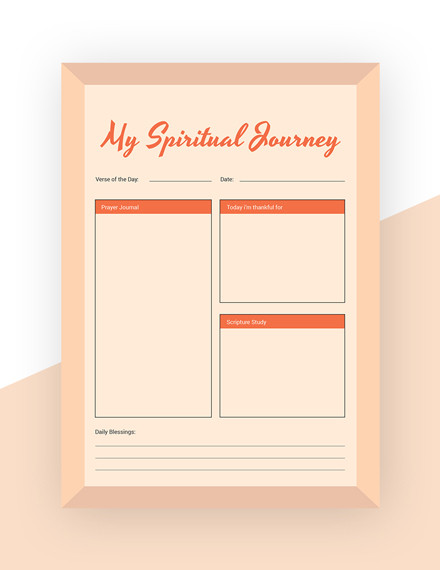
2. 15 Journal Writing Prompts for Kids
3. Handwritten Notebook Journaling
4. Journal Writing Sentence Starters
5. Writing Plans
Types of Journal Writing
Journal writing offers a versatile platform for self-expression, reflection, and creative exploration. Here are several types of journal writing to consider:
1. Personal Journal
A personal journal is a private space for documenting daily events, thoughts, and feelings. It allows you to reflect on your experiences and track your personal growth over time.
2. Travel Journal
A travel journal captures the experiences, sights, and insights gained during trips. It helps preserve memories and reflect on new cultures and adventures, often including descriptions of places visited, personal impressions, and even photos or sketches.
3. Gratitude Journal
A gratitude journal focuses on the positive aspects of life. By regularly writing about things you’re grateful for, you can enhance your mood and overall well-being. This type of journal encourages you to reflect on positive experiences and maintain a positive outlook.
4. Dream Journal
A dream journal is used to record and analyze dreams. It serves as a tool for understanding your subconscious mind and exploring recurring themes or symbols, often leading to deeper self-awareness and insights.
5. Bullet Journal
A bullet journal is a customizable organization system that combines elements of a planner, diary, and to-do list. It helps track tasks, habits, and goals, using bullet points for easy reference and allowing for personalized layouts and trackers.
6. Creative Writing Journal
A creative writing journal is dedicated to exploring ideas, character development, and plot outlines. It’s a space for writers to brainstorm and draft their stories, often including story ideas, character sketches, and writing prompts.
7. Reflective Journal
Reflective journals are used for deep thinking and self-examination. Common in educational settings, they help you reflect on learning experiences, analyze events or lessons learned, and gain insights and conclusions.
8. Art Journal
An art journal combines visual art and writing. It’s a creative outlet for expressing thoughts and emotions through sketches, paintings, and mixed media, often leading to unique and personal artistic expression.
9. Health and Wellness Journal
This type of journal tracks physical and mental health, fitness routines, and dietary habits. It helps set and achieve health-related goals, providing a comprehensive record of your wellness journey.
10. Project Journal
A project journal is used to plan, execute, and reflect on projects. It helps organize thoughts, track progress, and manage deadlines, making it a valuable tool for both personal and professional projects.
11. Learning Journal
A learning journal helps document and reflect on educational experiences. It’s useful for students and lifelong learners to track their progress, insights, and achievements, often including notes on lessons, readings, and goals.
12. Prayer or Spiritual Journal
This journal documents spiritual journeys, prayers, and reflections. It helps deepen your spiritual practice and connection, often including daily prayers or meditations, reflections on spiritual experiences, and insights into personal growth.
Importance of Journal Writing
Journal writing is a valuable practice with numerous benefits. Here are the top reasons why it is important:
1. Enhances Self-Reflection
Journal writing allows individuals to delve deep into their thoughts, feelings, and experiences. By regularly reflecting on personal events and emotions, you can gain valuable insights into your behavior and decision-making processes. This self-awareness fosters personal growth and helps you understand your strengths and areas for improvement.
2. Reduces Stress and Anxiety
Writing about your feelings and experiences can be therapeutic. It provides a healthy outlet for expressing emotions, which can alleviate stress and anxiety. By articulating your thoughts on paper, you can process difficult emotions and gain a sense of relief and clarity.
3. Boosts Creativity
A journal is a safe space for free expression, encouraging creative thinking. Whether through creative writing, doodling, or brainstorming, journaling stimulates the mind and nurtures creative ideas. This can lead to new projects, artistic endeavors, and innovative solutions to problems.
4. Tracks Personal and Professional Growth
Keeping a journal allows you to document your goals, achievements, and progress over time. This ongoing record helps you stay motivated and focused. By reviewing past entries, you can see how much you have grown and identify patterns that contribute to your success or setbacks.
5. Enhances Learning and Memory
Writing about daily events, lessons learned, or new information reinforces memory and comprehension. This practice is especially beneficial for students, as it helps retain and understand course material better. Journaling also aids in organizing thoughts, making it easier to recall and apply knowledge.
Benefits of Journal Writing
1. Enhances Self-Reflection
Journal writing allows you to reflect on your thoughts, feelings, and experiences, fostering self-awareness and personal growth.
2. Reduces Stress and Anxiety
Writing about your emotions can be therapeutic, helping to release tension and process difficult feelings, thereby reducing stress and anxiety.
3. Boosts Creativity
Journaling encourages free expression and idea generation, stimulating your creativity and leading to new projects or artistic endeavors.
4. Improves Writing Skills
Regular practice helps develop your writing style, expand your vocabulary, and improve grammar and structure.
5. Tracks Personal and Professional Growth
By documenting goals, achievements, and progress, you can monitor your development over time and stay motivated.
6. Enhances Memory and Learning
Writing about daily events and new information reinforces memory and comprehension, making it easier to retain and understand knowledge.
7. Supports Goal Setting and Achievement
A journal helps you set and track specific, measurable goals, increasing the likelihood of achieving them.
8. Provides a Safe Space for Expression
Journaling offers a private, non-judgmental space for expressing thoughts and feelings freely.
9. Strengthens Emotional Intelligence
Reflecting on emotions and experiences helps you understand and manage your emotions better, improving emotional intelligence.
10. Encourages Mindfulness
Writing in a journal promotes mindfulness by helping you focus on the present moment and your current experiences.
How to Write in a Journal
Writing in a journal is a valuable practice that can help you process your thoughts, reflect on your experiences, and improve your writing skills. Whether you are a student, educator, or simply someone looking to start journaling, here are some steps to guide you through the process.
1. Choose Your Journal
Select a journal that suits your needs. It can be a physical notebook or a digital platform. Consider the following:
- Size and portability: Will you carry it with you?
- Layout: Lined, unlined, or dotted pages?
- Design: Aesthetic appeal can motivate regular use.
2. Set a Routine
Establish a regular journaling routine. This can help make writing a habit. Consider:
- Time of day: Morning, evening, or during breaks?
- Frequency: Daily, weekly, or as needed?
3. Find a Comfortable Space
Choose a quiet and comfortable space where you can write without distractions. This can enhance your focus and creativity.
4. Start with a Prompt
Using prompts can help overcome writer’s block. Some examples include:
- Daily reflection: What was the highlight of your day?
- Gratitude: List three things you are grateful for today.
- Goals: What are your short-term and long-term goals?
5. Write Freely
Allow your thoughts to flow without worrying about grammar or structure. Journaling is a personal activity, and there are no rules. You can write about:
- Feelings and emotions: Express how you feel about recent events.
- Events and experiences: Describe significant moments.
- Ideas and plans: Outline your thoughts on future projects.
6. Reflect and Review
Occasionally, review your journal entries to reflect on your growth and changes over time. This can provide insights into your personal development.
7. Experiment with Different Styles
Try various journaling styles to keep the practice interesting:
- Narrative: Write your entries as stories.
- Lists: Create lists of books to read, goals, or achievements.
- Art journaling: Combine writing with sketches or drawings.
How do I start journaling?
Start by choosing a journal and setting a regular time to write. Begin with simple prompts or reflect on your day to get into the habit.
What should I write about in my journal?
Write about your daily experiences, thoughts, feelings, goals, and reflections. Use prompts for inspiration if you’re unsure where to start.
How often should I write in my journal?
Write as often as you can, ideally daily. Consistency helps build the habit and makes it easier to reflect on your thoughts and experiences.
Can journaling help with stress?
Yes, journaling can help manage stress by providing an outlet to express and process your feelings, identify stressors, and develop coping strategies.
Should my journal entries be long or short?
Your entries can be as long or short as you like. Focus on expressing your thoughts and feelings rather than the length of the entry.
Is it okay to use digital journals?
Absolutely, digital journals are convenient and accessible. They offer benefits like easy editing, search functions, and portability.
How do I overcome writer’s block in journaling?
Use prompts, write about simple observations, or start with a free-write session to get your thoughts flowing without worrying about structure.
Can journaling improve my writing skills?
Yes, regular journaling can enhance your writing skills by allowing you to practice expressing your thoughts clearly and creatively.
What are some good journaling prompts?
Prompts can include reflecting on a recent experience, writing about a goal, exploring a feeling, or describing something you’re grateful for.
Should I keep my journal private?
It’s up to you. Many people find value in keeping their journals private to encourage open and honest reflection without judgment.



